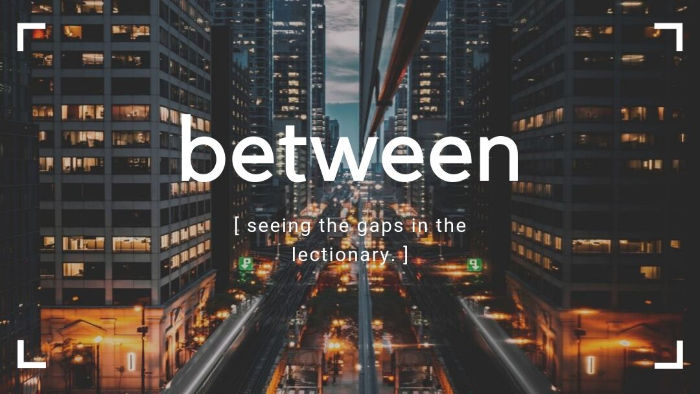
A look at the gaps in the lectionary.
This week: the gap between Proper 18A and 19A
The text: Matthew 18:15-20*
While there is no gap in the lectionary this week, last week’s gap is still lingering in pulpits this week.
If we just followed the lectionary by itself, we may have heard three very strange messages over the last three weeks.
- Jesus is the Messiah and Peter is his #1 disciple.
- Take up your cross and follow Jesus.
- Call people out on their sin in private and shun them if they don’t.
Tell me this doesn’t freak you out a little bit. Throw in this week’s “forgive people all the time” and we can see how weird this all starts to look when we notice it.
The episodic nature of preaching is a big part of the problem. As is the jumping around in the lectionary. But I don’t think that is everything, ultimately.
I think we have come up with reasons to not read Jesus with fidelity, grace, or courage.
Part of it is literalism, yes. But it isn’t just that.
Why we struggle with understanding
One of my favorite recurring jokes in the show How I Met Your Mother is that the character of Barney misunderstands who he is supposed to root for in movies. The joke works because Luke Skywalker is so obviously the hero and Darth Vader is clearly the villain of Star Wars.
We all get that. Not because we’re all diagramming the details in our minds or pinpointing a part of Star Wars when we go Yes, this is what heroes do. We just know. Intuition and storytelling make it clear to us in ways we don’t think about.
Another reason the joke is funny is that Barney’s reasons for seeing Darth Vader as the good guy are sort of reasonable. He’s just a guy with a dream and Luke messes it up by blowing up the Death Star. How terrible is that?!
From a certain point of view, we can potentially see Barney’s point. And a decade after the show made the joke, postmodern fascists adopted Darth Vader as a heroic symbol and the Death Star as a pseudo-ironic symbol for their movement.
It doesn’t mean that there is a genuine dispute about Darth Vader’s heroism. He remains the story’s antagonist. Not because of politics, but storytelling.
There’s a reason we ought to trust our guts more than we do. Because our heads sometimes get mixed up, and allow for an unbalancing of our motivations and expectations. Through a desire to maintain objectivity, we entertain the very notion that Darth Vader might actually be a good guy. But doing that violates the number one thing we have to go on.
The story.
So our story this week, in which Jesus teaches the disciples about forgiveness is genuinely clear. And our instincts about it are solid.
And while we might think that it’s meaning is evidentially straightforward, I think the greater value in it is that it is consistent with the greater story. And makes a far greater impact when we consider the story the disciples are experiencing because it is the story we’re all reading together.
This is why the gaps can fail us. Because we’re missing this tremendous plot.
Jesus and the disciples are heading to Jerusalem in a love revolution. They will face death and win. Not militarily. And not as a new empire. There will be no restored monarchy or Hebrew greatness. There will be pain and new birth. And there will be God’s grace.
It is easy to lose track of the interconnected themes of the function of power in our world and the needed powerlessness in the Kin-dom; of love and mercy over hate and revenge; of heavenly hope over earthly certainty. The readings scan like advice for better living more than the clues to the Kin-dom they are.
Unless we focus on the story.
The story always reminds us of the truth. When we read it all together.
